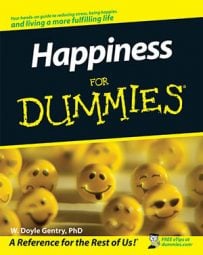One of the prerequisites of getting into flow and being happy has to do with knowing yourself. That doesn’t just mean name, rank, and serial number. Ask yourself the following questions to determine who you really are:
What makes you tick?
What makes you unique?
What satisfies you and makes you happy?
What gives your life a sense of purpose?
These are not easy questions to answer for some readers. In part, the difficulty lies in the fact that you may be too caught up in the daily “rat race” to have the time for some healthy introspection. Also, if you’re one of those co-dependent personalities, you’re more aware of what gives others a sense of purpose than you’re aware of these things in your own life.
It doesn’t take a lifetime to understand what’s unique about yourself. Some 20-year-olds already have a clear sense of who they are — and can answer these questions without hesitation — whereas others who find themselves in the second half of life still don’t have a clue.
Every experience you encounter in life — good or bad — shapes and ultimately defines who you are. Your job is to learn from each of those experiences and progress, slowly but surely, toward what the eminent American psychologist Abraham Maslow called a state of self-actualization.
According to Maslow, you can only get to this point when your biological needs are adequately and consistently satisfied, when you feel secure, when you feel loved and supported by significant others, and when you have developed a sense of mastery over life — again, you don’t have to wait for the end of life’s journey to be self-actualized, and some never make it no matter how long they live.
The importance of taking a bad job to be happy
Dr. Csikszentmihalyi noted that, contrary to what you might imagine, people experience more opportunities for flow at work than they typically do in their free time. But, that depends, of course, on whether you like what you do for a living or not.
You might consider encouraging your kids to get jobs at an early age, not just to make money or learn a work ethic, but so they can begin to discover which types of work suit them – and lead to enjoyment - and which don’t.
Because you’re going to spend most of your waking life working in some capacity, you’re better off working at something that gives your life a sense of purpose and pleasure — something that allows you to utilize your strong points every day.
If you find yourself in a job or other experience that is making you miserable, think of it as one more piece of evidence that tells you what you don’t want to be doing. In other words, every time you find a job you hate, you’re one step closer to finding the job you’ll love.
How to avoid a midlife crisis
Knowing who you really are not only helps you stay in flow, it will also keep you from experiencing the dreaded midlife crisis.
The notion that a midlife crisis is inevitable as soon as you turn 40 years of age is untrue. If you reach your 40s and you haven’t yet begun to live life on your own terms, you could experience a crisis. The good news is it doesn’t have to be this way.
Consider this exchange with a 47-year-old man in a highly depressed, agitated state:
Client: I’m just so sick and tired of always doing what other people want. I never get to do what I want — it’s always “You need to do this; you need to do that; go here; go there.” There’s no end to it.
Psychologist: So, tell me what you want to do this coming weekend.
Client: I have to go to my son’s baseball game on Saturday, and my wife wants…
Psychologist: (Interrupting) Excuse me, but I asked you what you wanted to do, not what they wanted you to do. Isn’t that what you’re complaining about — that no one asks about or cares what you want to do? Well, I’m asking.
Client: (Silent and looking more agitated)
Psychologist: You seem to be having trouble answering my question. How do you feel right now?
Client: I’m upset — angry — because I don’t know what to say.
Psychologist: Precisely. I can see you’re angry — your face is red and your fists are all balled up. Now, try to look at this from my perspective. You’re a middle-aged man who has done everything that life has asked or demanded of you. You’re a real boy scout!
And, you’re successful as far as the material things of life go. But you can’t tell me how you want to spend one day of your life without referring to everybody else’s needs rather than your own. Does that seem right to you?
Client: (looking very sad and tearful) No, it doesn’t.
Psychologist: Well, we’re agreed on that. Now all we have to do is help you find the answer to that question and maybe then you’ll start enjoying life for a change.
This man was in crisis not because of his age, not because he made a lot of money at his job, not because he had a lovely wife and three great kids — he was in crisis because he had made it halfway through his life and he had no clue about who he really was.
The time to deal with a midlife crisis is before it happens. The vast majority of folks actually enter midlife feeling pretty good about the way their life is going. However, if you’re not one of those fortunate people, then you’ll definitely want to take steps to engineer more flow in your life.

